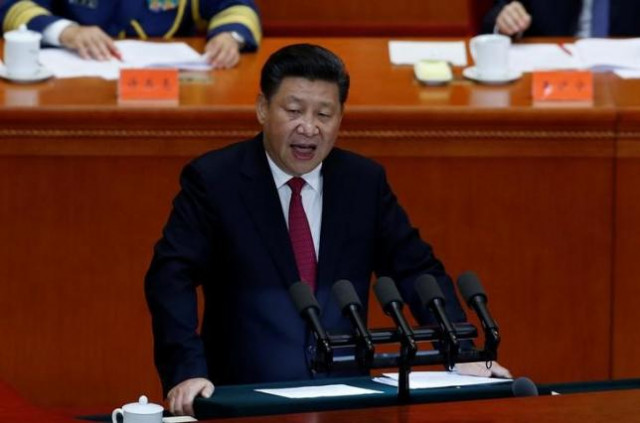China says all welcome at Silk Road forum after US complains over North Korea
Western diplomats have expressed unease about both the summit and the plan as a whole

Chinese President Xi Jinping makes a speech at the celebration of the 95th anniversary of the founding of the Communist Party of China at the Great Hall of the People in Beijing PHOTO: REUTERS
Two sources with knowledge of the situation said the US embassy in Beijing had submitted a diplomatic note to China's foreign ministry, saying that inviting North Korea sent the wrong message at a time when the world was trying to pressure Pyongyang over its repeated missile and nuclear tests. The spat over North Korea threatens to overshadow the summit, China's most important diplomatic event of the year for an initiative championed by Chinese President Xi Jinping.
Asked about the US note, China's Foreign Ministry said in
a short statement sent to Reuters that it did "not understand
the situation". The statement added: "The Belt and Road initiative is an open and inclusive one. We welcome all countries delegations to
attend the Belt and Road Forum for International Cooperation". The ministry did not elaborate. It said on Tuesday that North Korea would send a delegation to the summit but gave no other details.
US lauds professionalism of Pakistan Navy in maritime security
China has not announced who North Korea's chief delegate
will be, but South Korea's Yonhap news agency said Kim Yong Jae,
North Korea's minister of external economic relations, will lead
the delegation. Delegates will hold a series of sessions on Sunday afternoon to discuss the plan in more detail, including trade and finance. China has given few details about attendees. Leaders from 29 countries will attend the forum in Beijing on May 14-15, an event orchestrated to promote Xi's vision of expanding links between Asia, Africa and Europe underpinned by billions of dollars in infrastructure investment.
Some Western diplomats have expressed unease about both the
summit and the plan as a whole, seeing it as an attempt to
promote Chinese influence globally. China has rejected criticism of the plan and the summit, saying the scheme is open to all, is a win-win and aimed only at promoting prosperity. In an English-language commentary on Saturday, China's state-run Xinhua news agency said the new Silk Road, officially called the Belt and Road initiative, would be a boon for developing countries that had been largely neglected by the West.
"As some Western countries move backwards by erecting
'walls,' China is contriving to build bridges, both literal and
metaphorical. These bridges are China's important offering to
the world, and a key route to improving global governance," it
said. Despite Chinese anger at North Korea's repeated nuclear and
missile tests, China remains the isolated state's most important
economic and diplomatic backer, even as Beijing has signed up
for tough UN sanctions against Pyongyang.
China has over the years tried to coax North Korea into
cautious, export-oriented economic reforms, rather than sabre
rattling and nuclear tests, but to little avail.



















COMMENTS
Comments are moderated and generally will be posted if they are on-topic and not abusive.
For more information, please see our Comments FAQ